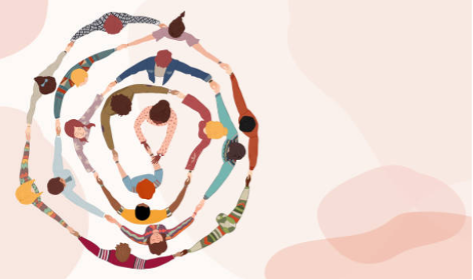Introduction by: Heidi Alexander, President of IWIL
I’m Heidi Alexander, and I am the President of the Institute for Well-Being in Law. I’m licensed to practice law in multiple states and currently serve as the first Director for the Massachusetts Supreme Judicial Court Standing Committee on Lawyer Well-Being. I’m also a queer woman raising three children. I understand firsthand the importance of allyship and its impact on my mental health and well-being.
I’ve encountered active and intentional allies throughout my career and personal life. This is particularly important in a profession that is steeped in tradition, resistant to change, and has actively excluded and alienated individuals from underrepresented and marginalized communities. Many of us face significant challenges that impact our mental health and overall well-being. Allyship—supportive actions taken by those in positions of privilege to advocate for marginalized groups—is essential in creating a more inclusive and supportive environment. Effective allyship is not merely performative; it is a meaningful and active commitment that fosters a sense of belonging, reduces isolation, and enhances the mental and emotional well-being of those who have been traditionally excluded.
Statistics highlight the pressing need for allyship in the legal profession. Nearly all data that has looked at demographic differences in mental health and well-being in the legal profession finds that individuals from underrepresented and marginalized communities have poorer mental health and well-being outcomes as compared to their White male counterparts.
Allyship is particularly important for the well-being of historically underrepresented and excluded professionals because it addresses the systemic inequities and biases that we face. We often endure microaggressions, discrimination, and a lack of representation, leading to increased stress, anxiety, and a sense of isolation. Active allyship involves recognizing these challenges and taking concrete steps to support and uplift marginalized colleagues. This can include advocating for equitable policies, providing mentorship, and creating safe spaces where underrepresented voices are heard, valued, and amplified.
The benefits of allyship extend beyond the individuals directly affected. When allies actively support their marginalized colleagues, it fosters a more inclusive and diverse workplace culture. This inclusivity not only enhances the well-being and mental health of underrepresented professionals but also contributes to a more dynamic and innovative legal community. Professionals who feel supported and valued are more likely to thrive, leading to greater job satisfaction, retention, and overall productivity. Moreover, active allyship can challenge and change harmful norms and practices within the profession, paving the way for future generations of diverse legal professionals to succeed in a more equitable environment.
To illustrate the impact of effective allyship, the following article by Mason Dunn provides a specific example of allyship in action. Through this example, we see how meaningful support and solidarity can significantly benefit the well-being and mental health of marginalized professionals, demonstrating the profound difference between performative and active allyship.
Moving the Needle: From Performative to Active Allyship, Part 1
By Mason J. Dunn, JD
 As I look back on the rainbow tinted joy and chaos of Pride Month, I find myself grappling with a unique but growing challenge: performative allyship. Throughout June, I traveled the country for various Pride events, and at every instance I found myself dismayed and disappointed by the actions of cisgender and heterosexual allies who failed to recognize their privilege and role in these spaces. Lest I be perceived as overly negative, let me confirm: there were, in numerous cases, shining examples of active, meaningful, and authentic allyship. However, these moving examples were not nearly as loud as those self-declared so-called allies, who draped themselves in rainbows, danced with our queens, sang out “Born this Way” with gusto, yet failed to show up when things weren’t nearly so joyous. Particularly in a community as aware, informed, and resourced as the legal community, I hope and ask that legal allies take this opportunity to assess how we, lawyers and advocates committed to justice, can do better in and for our communities.
As I look back on the rainbow tinted joy and chaos of Pride Month, I find myself grappling with a unique but growing challenge: performative allyship. Throughout June, I traveled the country for various Pride events, and at every instance I found myself dismayed and disappointed by the actions of cisgender and heterosexual allies who failed to recognize their privilege and role in these spaces. Lest I be perceived as overly negative, let me confirm: there were, in numerous cases, shining examples of active, meaningful, and authentic allyship. However, these moving examples were not nearly as loud as those self-declared so-called allies, who draped themselves in rainbows, danced with our queens, sang out “Born this Way” with gusto, yet failed to show up when things weren’t nearly so joyous. Particularly in a community as aware, informed, and resourced as the legal community, I hope and ask that legal allies take this opportunity to assess how we, lawyers and advocates committed to justice, can do better in and for our communities.
For the past two years I have had the somber honor of memorializing the trans and gender diverse people who have been taken from us in the past year due to hate, prejudice, and violence. This year we carried their memory through the Boston Pride for the People and Rhode Island Pride parades. For weeks leading up to the event, I spent hours listing the names of our dead, finding their photos, reading their obituaries, and crafting personalized posters for each of them. It is a personally taxing task that leaves me emotionally exhausted. I am lucky to have a partner, close friends, and community members who help gather the information, assemble the posters, and hold space for me to process these emotions; without them I don’t think I would have been able to complete this second year.
We had nearly 80 names of our dead to memorialize who have passed in the last year.
In addition to gathering information and creating the posters, I am tasked with finding volunteers to carry the memorial through the streets of Boston and Providence. We march in silence, asking the crowds to join us in the memory of those no longer with us. This march is a stark contrast to the joy and celebration of Pride, but a necessary reminder of the work that remains. It is our opportunity to bring these beloved community members to Pride one last time. And each year I struggle to find allies to help carry this emotional and physical burden.
This year we didn’t have enough people sign up to carry every memorial poster.
Undaunted, a small group of us walked the parade staging area before we started, begging for volunteers from large marching groups to join us. If every marching group had just one volunteer join the memorial march, we would have had enough. Yet we were told, time and again, that people would rather march with their elected officials, their corporate sponsor, their church group, etc. People, most notably allies, expressed that the memorial was not how they wanted to celebrate Pride.
And here’s where the shining example of active allyship and community support showed up this year: ahead of the parade, I told the stalwart volunteers we assembled that there weren’t enough people for each poster to be carried. One volunteer chimed in that they would carry two; another picked up four, lashing them together silently, and lining up to march.
In the end, every poster was carried in Boston and Rhode Island in the pride parades, thanks to those willing to carry more than they were asked. But the experience has left me with significant reflections on how allyship shows up in and for our communities. The allies who silently marched, some coming from great distances, some showing up for both parades – they did so without fanfare or self proclamation of allyship. In contrast, I noted with great sadness the allies wearing their label emblazoned on their clothing and buttons, who, when asked to help would proclaim “I’m an ally” followed shortly with “but…”
These actions, of declining the invitation to help our community memorialize our dead, are not a unique or isolated instance. In my 20 years of work for LGBQ+ rights and equity I’ve heard proclamations of allyship followed by all manner of heterosexist and cissexist statements. “I’m an ally….but pronouns are hard.” “I’m an ally…but they need to make up their mind.” “I’m an ally…but I don’t understand why they have to dress/act/be that way.” The list goes on.
So where do we go from here? What is to be done to address and move the performative nature of these allies into something active and meaningful? Stay tuned for part two of this article to discuss some ways you, or those in your life, might level up their allyship from performative to active.
 Mason (he/they) serves as the Director of Education and Research with the Massachusetts LGBT Chamber of Commerce. A lawyer and educator, Mason brings over 15 years of LGBTQ+ advocacy experience to the Chamber. Before joining the team, they served as Deputy Director for the Division of Education and Training at the Fenway Institute, Director of Advocacy for Keshet, State and Local Policy Manager for GLSEN, and Executive Director of the Massachusetts Transgender Political Coalition. In 2018 Mason co-chaired the historic Yes on 3 campaign which successfully defended the Massachusetts trans-inclusive public accommodations nondiscrimination law, in the nation’s first-ever state-wide vote on transgender rights.
Mason (he/they) serves as the Director of Education and Research with the Massachusetts LGBT Chamber of Commerce. A lawyer and educator, Mason brings over 15 years of LGBTQ+ advocacy experience to the Chamber. Before joining the team, they served as Deputy Director for the Division of Education and Training at the Fenway Institute, Director of Advocacy for Keshet, State and Local Policy Manager for GLSEN, and Executive Director of the Massachusetts Transgender Political Coalition. In 2018 Mason co-chaired the historic Yes on 3 campaign which successfully defended the Massachusetts trans-inclusive public accommodations nondiscrimination law, in the nation’s first-ever state-wide vote on transgender rights.